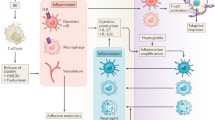Abstract.
Eicosanoids are a family of lipid mediators derived from the metabolism of arachidonic acid. Eicosanoids, such as prostanoids and leukotrienes, have a wide range of biological actions including potent effects on inflammation and immunity. It has been almost 20 years since the first reports emerged suggesting a role for eicosanoids in transplantation. Since then, a number of functions have been ascribed to these mediators, ranging from immunomodulation to regulation of allograft hemodynamics. In this review, we will highlight the effects of eicosanoids in transplantation, focusing particularly on evidence provided by gene targeting studies. In the future, pharmacological manipulation of eicosanoids and their receptors may provide a novel approach for controlling inflammation and promoting allograft acceptance.
Similar content being viewed by others
Author information
Authors and Affiliations
Rights and permissions
About this article
Cite this article
Rocha, P.N., Plumb, T.J. & Coffman, T.M. Eicosanoids: lipid mediators of inflammation in transplantation. Springer Semin Immunopathol 25, 215–227 (2003). https://doi.org/10.1007/s00281-003-0132-4
Issue Date:
DOI: https://doi.org/10.1007/s00281-003-0132-4



